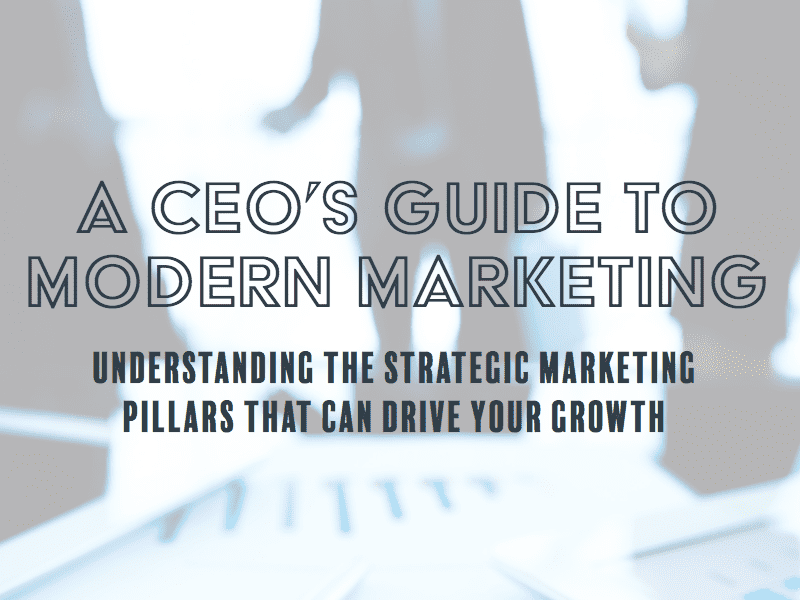12 Marketing Tips for CEOs, Straight from the Experts
As a CEO or other senior leader, you expect your marketing investment to have a measurable impact on the business and the bottom line. How do you make that happen?
Marketri asked industry experts to provide their top marketing advice for CEOs who are ready to put marketing to work as a revenue-generating engine. Here’s what they had to say!
On Hiring a Marketing Leader
April Lisonbee, Content Marketing Strategist, thomasarts:
“Find a marketing leader who values good processes as much as good people. Marketing departments are a mashup of data analysts and artists, among others, so teams don’t always speak the same language. This can lead to costly mistakes, suboptimal campaigns that waste money, and lower morale. A good marketing leader should prioritize creating and continuously improving marketing processes that focus on results, without killing creativity.”
Sylvia Marten, Fractional CMO, Marketri:
“You ideally want someone with experience in both the stage your company is in and where it’s headed in the next 3-5 years. I’ve seen big company/corporate marketers struggle in early-stage and high-growth settings, and small/young company marketers who don’t bring experience in scaling up marketing. Another key consideration is their experience with cost center marketing vs. profit center marketing, which are vastly different! If you’re committed to a profit center marketing approach, the marketing leader you hire should be too.”
Sue Norelle Bortone, Senior Director, Business Development & Brand Partnerships, Cella:
“It’s important not to get hung up on titles or that people have to come from the hottest shops. There are great, innovative ideas coming out of start-ups, smaller shops, and talent at all levels, especially with the changing times. Everyone has changed how they do business and how they approach consumers digitally, allowing for some truly unique thinking to emerge across the digital landscape. It’s about what someone has done and how they approach finding new solutions, vs. someone coming from the coolest company or having the fanciest title/most experience.”
On Defining What Marketing Is (and Isn’t)
Deb Andrews, President/Founder, Marketri:
“Sometimes people view marketing as a random list of tactics to be implemented throughout the year. Or it’s associated with a specific channel, like social media or email. Or they think of marketing as sales enablement—creating collateral, sell sheets, and PowerPoints. In reality, marketing should be a strategic, integrated approach, organized around specific themes or topics or services, designed to drive a business result. It’s a program of consistent, thoughtful, multi-channel communications over time. And it should always be in a revenue-generating role.
Michael Brenner, CEO, Marketing Insider Group:
“There should always be an expectation that marketing will deliver quantifiable business results. But some people in an organization may define marketing as ‘the people who do stuff, like campaigns and events.’ CEOs expect marketers to deliver a return on investment, which they should. Sometimes that means having a conversation about what marketing can do for the company and setting up realistic expectations about the marketing activities that can’t produce those results.”
On Setting up Marketing for Success
Sylvia:
“First, marketing and sales should be connected and work closely as a team, to avoid the silo problems that can occur when they work independently. Second, make sure every business unit has a marketing plan that spells out the roles and responsibilities of anyone involved, to ensure accountability. Third, connect each marketing effort to clearly defined goals, using a framework like SMART (specific, measurable, achievable, realistic, and time-bound). Then measure progress against those goals and optimize your marketing relentlessly.”
Deb:
“Having a culture that values a strategic marketing plan is critical to success. Especially in companies with multiple products, services, or sectors, the plan allows you to focus on areas of your business you want to grow strategically—those with the best long-term potential and those that can generate short-term revenue (which can help fund the longer-term initiatives). It’s not about giving equal ‘love’ across the organization. You should allocate your marketing where they’ll generate the best results.”
On Leveraging Data in Marketing
Christine Nurnberger, CMO, Bottomline Technologies:
“Data is your friend, and it can be very powerful—especially for demonstrating that when your marketing is strategic, thoughtful, and planned out, it will generate results. You obviously don’t want to stifle the creativity and ideas that come to marketing, but you don’t want to waste time, dollars, and other resources doing marketing you know won’t be effective. The data is really your best friend in those scenarios.”
Deb:
“When you’re developing a strategic marketing plan, you want to look at data like the gross margin of different services or business lines, so you can allocate your marketing resources where there’s strong growth potential. Data is important for measuring results, whether it’s the metrics of a specific campaign or your overall numbers on a monthly or quarterly basis as compared to your goals. And data allows you to adjust your marketing and test different options to drive better results, always focusing on the metrics that matter to your business. With a couple of years’ worth of data, you can almost become predictive—for example, you’ll know that if you do this many more blog posts you’ll generate this many more leads, and if you spend this much more on marketing you’ll generate this much more in revenue.”
On Using Content to Guide Your Buyer’s Journey
Michael:
“At each stage of the customer’s buying journey, relevant content can bring them to the website, engage them, and help convert them to buyers. Content is not the same as a campaign; it allows you to reach, engage, and convert the majority of people who ignore promotional marketing. It’s up to marketers to build a business case for developing good content.”
On How to Keep the Business from Dictating Marketing Tactics
Christine:
“We had a line of business asking for very tactical email campaigns. After we tried their approach, we were able to show them the email opt-out rate was skyrocketing, the open rates were dropping, and the unsubscribe rate was increasing. Based on the data, we suggested we press ‘pause’ and think about the business outcomes they wanted to achieve vs. just pushing out the next great idea.”
Deb:
“An organization might be used to letting the leadership team or business unit heads create a list of marketing tactics: ‘We want 4 webinars a quarter and 6 social media posts a week.’ When you bring in a marketing leader for the first time, you need to allow that leader to build a strategic marketing plan, based on data, and create a case for where to best allocate your marketing dollars. Your marketing leader will want to look at which markets are mature vs. growing, where you already have traction vs. where you’ll be starting from scratch, and what positioning and messaging will resonate best with different sectors or different target audiences. Then they can structure campaigns that will best meet the company’s goals.” The experienced B2B marketers at Marketri can help you put tips like these to work—turning your marketing function into a revenue-generating initiative. We’ve helped many B2B companies drive strong revenue growth by developing and executing strategic marketing plans. Contact Marketri to learn more!
For more information on creating a strategic marketing plan, check out our CEO’s Guide to Modern Marketing.






